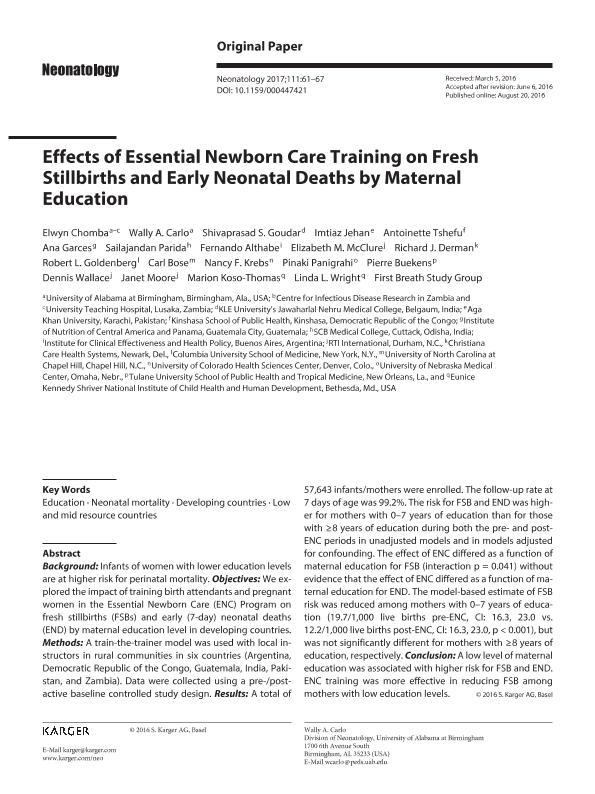Mostrar el registro sencillo del ítem
dc.contributor.author
Chomba, Elwyn
dc.contributor.author
Carlo, Wally A.
dc.contributor.author
Goudar, Shivaprasad S.
dc.contributor.author
Jehan, Imtiaz
dc.contributor.author
Tshefu, Antoinette
dc.contributor.author
Garces, Ana
dc.contributor.author
Parida, Sailajandan
dc.contributor.author
Althabe, Fernando

dc.contributor.author
McClure, Elizabeth M.
dc.contributor.author
Derman, Richard J.
dc.contributor.author
Goldenberg, Robert L.
dc.contributor.author
Bose, Carl
dc.contributor.author
Krebs, Nancy F.
dc.contributor.author
Panigrahi, Pinaki
dc.contributor.author
Buekens, Pierre
dc.contributor.author
Wallace, Dennis
dc.contributor.author
Moore, Janet
dc.contributor.author
Koso Thomas, Marion
dc.contributor.author
Wright, Linda L.
dc.contributor.author
First Breath Study Group
dc.date.available
2018-05-14T18:40:56Z
dc.date.issued
2016-12
dc.identifier.citation
Chomba, Elwyn; Carlo, Wally A.; Goudar, Shivaprasad S.; Jehan, Imtiaz; Tshefu, Antoinette; et al.; Effects of Essential Newborn Care Training on Fresh Stillbirths and Early Neonatal Deaths by Maternal Education; Karger; Neonatology; 111; 1; 12-2016; 61-67
dc.identifier.issn
1661-7800
dc.identifier.uri
http://hdl.handle.net/11336/45119
dc.description.abstract
Background: Infants of women with lower education levels are at higher risk for perinatal mortality. Objectives: We explored the impact of training birth attendants and pregnant women in the Essential Newborn Care (ENC) Program on fresh stillbirths (FSBs) and early (7-day) neonatal deaths (END) by maternal education level in developing countries. Methods: A train-the-trainer model was used with local instructors in rural communities in six countries (Argentina, Democratic Republic of the Congo, Guatemala, India, Pakistan, and Zambia). Data were collected using a pre-/post-active baseline controlled study design. Results: A total of 57,643 infants/mothers were enrolled. The follow-up rate at 7 days of age was 99.2%. The risk for FSB and END was higher for mothers with 0-7 years of education than for those with ≥8 years of education during both the pre- and post-ENC periods in unadjusted models and in models adjusted for confounding. The effect of ENC differed as a function of maternal education for FSB (interaction p = 0.041) without evidence that the effect of ENC differed as a function of maternal education for END. The model-based estimate of FSB risk was reduced among mothers with 0-7 years of education (19.7/1,000 live births pre-ENC, CI: 16.3, 23.0 vs. 12.2/1,000 live births post-ENC, CI: 16.3, 23.0, p < 0.001), but was not significantly different for mothers with ≥8 years of education, respectively. Conclusion: A low level of maternal education was associated with higher risk for FSB and END. ENC training was more effective in reducing FSB among mothers with low education levels.
dc.format
application/pdf
dc.language.iso
eng
dc.publisher
Karger

dc.rights
info:eu-repo/semantics/openAccess
dc.rights.uri
https://creativecommons.org/licenses/by-nc-sa/2.5/ar/
dc.subject
Developing Countries
dc.subject
Education
dc.subject
Low And Mid Resource Countries
dc.subject
Neonatal Mortality
dc.subject.classification
Salud Ocupacional

dc.subject.classification
Ciencias de la Salud

dc.subject.classification
CIENCIAS MÉDICAS Y DE LA SALUD

dc.title
Effects of Essential Newborn Care Training on Fresh Stillbirths and Early Neonatal Deaths by Maternal Education
dc.type
info:eu-repo/semantics/article
dc.type
info:ar-repo/semantics/artículo
dc.type
info:eu-repo/semantics/publishedVersion
dc.date.updated
2018-03-27T15:16:04Z
dc.journal.volume
111
dc.journal.number
1
dc.journal.pagination
61-67
dc.journal.pais
Suiza

dc.journal.ciudad
Basel
dc.description.fil
Fil: Chomba, Elwyn. University Of Alabama At Birmingham; Estados Unidos. Centre For Infectious Disease Research In Zambia; Zambia. University Teaching Hospital Lusaka; Zambia
dc.description.fil
Fil: Carlo, Wally A.. University Of Alabama At Birmingham; Estados Unidos
dc.description.fil
Fil: Goudar, Shivaprasad S.. Kle University India; India
dc.description.fil
Fil: Jehan, Imtiaz. The Aga Khan University; Pakistán
dc.description.fil
Fil: Tshefu, Antoinette. Kinshasa School Of Public Health; República Democrática del Congo
dc.description.fil
Fil: Garces, Ana. Institute Of Nutrition Of Central America And Panama Guatemala; Guatemala
dc.description.fil
Fil: Parida, Sailajandan. SCB Medical College; India
dc.description.fil
Fil: Althabe, Fernando. Instituto de Efectividad Clínica y Sanitaria; Argentina. Consejo Nacional de Investigaciones Científicas y Técnicas; Argentina
dc.description.fil
Fil: McClure, Elizabeth M.. Rti International; Reino Unido
dc.description.fil
Fil: Derman, Richard J.. Christiana Care Health System; Estados Unidos
dc.description.fil
Fil: Goldenberg, Robert L.. Columbia University; Estados Unidos
dc.description.fil
Fil: Bose, Carl. University of North Carolina; Estados Unidos
dc.description.fil
Fil: Krebs, Nancy F.. University of Colorado; Estados Unidos
dc.description.fil
Fil: Panigrahi, Pinaki. University Of Nebraska Medical Center; Estados Unidos
dc.description.fil
Fil: Buekens, Pierre. Tulane University. School Of Public Health And Tropical Medicine; Estados Unidos
dc.description.fil
Fil: Wallace, Dennis. Christiana Care Health System; Estados Unidos
dc.description.fil
Fil: Moore, Janet. Christiana Care Health System; Estados Unidos
dc.description.fil
Fil: Koso Thomas, Marion. National Instituto Of Child Health & Human Development; Estados Unidos
dc.description.fil
Fil: Wright, Linda L.. National Instituto Of Child Health & Human Development; Estados Unidos
dc.description.fil
Fil: First Breath Study Group. No especifica;
dc.journal.title
Neonatology

dc.relation.alternativeid
info:eu-repo/semantics/altIdentifier/doi/http://dx.doi.org/10.1159/000447421
dc.relation.alternativeid
info:eu-repo/semantics/altIdentifier/url/https://www.karger.com/Article/FullText/447421
Archivos asociados
